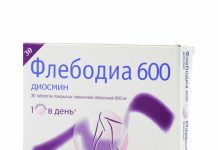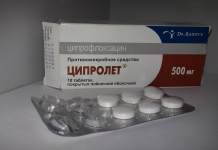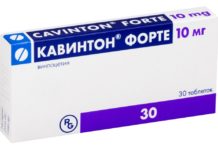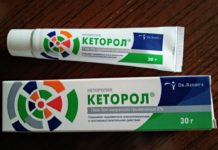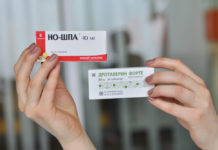Non-steroidal anti-inflammatory drugs are a group of drugs that are most often used to relieve inflammatory processes and pain. In this article, we will consider one of the most prominent representatives of the group. The drug "Ibuprofen" - what do these pills help from, and what consequences of use should be feared?
Material Content:
Forms of release, composition
The medicine against heat and pain is available in the form of round, white or slightly yellowish tablets with a shell, packaged in contour cells (10 pieces per blister). One to five blisters and instructions for use are placed in one cardboard box.
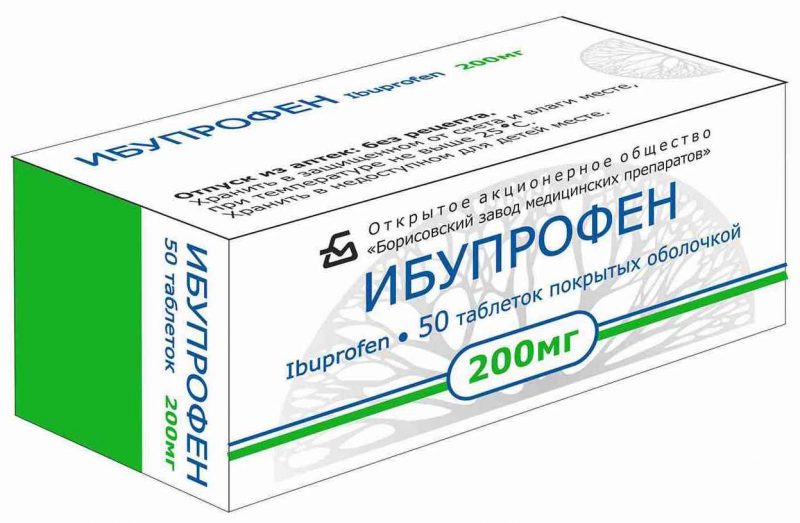
The drug works due to the active component - ibuprofen. One tablet contains 200 or 400 mg of active ingredient. In addition to the compound that stops the inflammatory process, starch, dye, low molecular weight polymer, sorbate and stearic acid are added to the medicine.
Pharmacological action and pharmacokinetics
In the presence of the main active ingredient of the tablets, the cyclooxygenase 1 and 2 enzyme stops its action, as a result of which the conversion of arachidonic acid to prostaglandins stops. Prostaglandins are lipid compounds that transmit momentum from one cell to another.They start the process of inflammation, as a result of which a pain syndrome occurs.
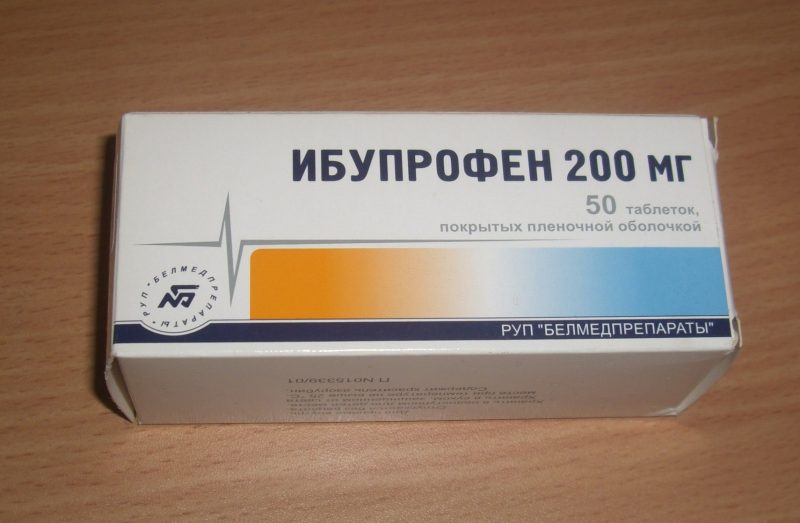
The action of the drug is aimed at relieving swelling around the affected joint, relieving pain and lowering the temperature. The pain becomes less pronounced both at rest and in movement. Under the influence of the drug, motility, constrained by inflammation of the joint, rises. Improved mobility is noted not only during the day, but also in the morning.
The medicine is best absorbed when taken separately from food. After eating before meals, it is detected in the blood in the highest concentrations after 45 minutes. If the tablet was drunk after a meal, then the highest concentration can be detected no earlier than after 1.5 hours.
The chemical compound actively penetrates into joint tissues and fluids. After 24 hours, it is completely eliminated from the body. The anti-inflammatory effect develops along the cumulative. To achieve a tangible result, tablets should be drunk regularly for one, two weeks.
Inactivation of the active component occurs in the liver. Less than one percent of the chemical compound is utilized by the kidneys and bile. In the elderly, pharmacokinetics are passing at the same pace.
What helps ibuprofen
This medication is intended to relieve pain caused by inflammation. The drug is also capable of lowering body temperature for a while.
Among the indications:
- Swelling and decreased mobility of the limbs due to inflammation and destruction of the joints as a result of the development of psoriasis, gout, rheumatism, spinal diseases, autoimmune diseases.
- Pain of various nature: muscle, dental, headache, menstrual, post-traumatic, postoperative, associated with inflammation of the pelvic organs, with the development of cancerous tumors.
- Heat and fever with colds and flu.
The medicine does not have a therapeutic effect. It does not affect the course of the disease. It is used only to relieve symptoms.
Instructions for use and dosage of ibuprofen
To reduce the effect on the gastrointestinal tract, tablets are taken after meals. The recommended interval between doses is 6 hours. You can drink the medicine again no earlier than four hours later.
For children

The dosage form of the tablet can be taken for children over six years old. The weight of the child must be at least 20 kg. A single dose for a representative of the younger group of patients is 200 mg. The maximum number of Ibuprofen receptions for children per day is four.
For adults

Adults and children from 12 years old are prescribed the same single dose - 400 mg. It is permissible to take tablets (400 mg) up to three times a day. After 18 years, no more than 1200 mg of the active substance is allowed for one day. Patients under the age of majority may drink no more than 1000 mg of Ibuprofen per day.
Without examination by a specialist, the drug can be taken as an antipyretic or analgesic for no longer than three consecutive days.
Pregnancy and lactation
During pregnancy and lactation, the drug can be used only as directed by a doctor. For women, the Ibuprofen position is considered less dangerous than other analgesics and acetylsalicylic acid. The likelihood of uterine bleeding during administration is negligible.

It is worth mentioning that the drug is allowed to be used only in the first and second trimester of pregnancy. At later dates, it is strictly prohibited, since it reduces the synthesis of hormones responsible for labor, and is also able to provoke intrauterine development of pulmonary failure in the fetus and baby.
During the period of breastfeeding, the drug is not canceled.
Drug Interactions with Other Drugs

- The combined use of the drug in question and other non-steroidal anti-inflammatory drugs increases the risk of bleeding. The same effect is observed with the simultaneous administration of tablets and drugs that reduce the rate of blood coagulation.
- Co-administration with depression medications is not recommended. As a result of combination therapy, there is a risk of gastric bleeding.
- These tablets increase the concentration of drugs that artificially suppress the effects of immunity (cyclosporine and gold-containing drugs). As a result, the burden on the kidneys and the threat of the development of a nephrotoxic effect increase.
- Calcium-blocking drugs that increase heart rate increase the proportion of a drug substance in the blood.
- Substances that accelerate microsomal oxidation, such as ethyl alcohol, tricyclic antidepressants and barbiturates, increase the risk of the drug in question for the liver. Their combined use is fraught with the development of toxic shock. Substances, on the contrary, inhibiting microsomal oxidation neutralize the hepatotoxic effect.
- The medicine is incompatible with vasodilator drugs. It reduces their overall calming effect on the central nervous system.
- Simultaneous administration with estrogens and corticosteroids provokes the appearance of hematomas and bleeding.
- In order to avoid an increase in the load on the liver, it is not recommended to take tablets with drugs, mainly decomposing in the hematopoietic organ.
- The drug enhances the action of insulin and increases the toxicity of antitumor drugs.
Ibuprofen: contraindications, side effects and overdose

Cases in which the appointment of the drug is contraindicated:
- a tendency to allergies to any of the constituent components;
- intolerance to acetylsalicylic acid and other non-steroidal analgesic agents;
- combination in any combination of aspirin intolerance with bronchial asthma, polyposis of the nasal mucosa and sinuses.
The drug is not prescribed:
- patients suffering from inflammatory and peptic ulcer diseases of the stomach and intestines, which are in an acute or active stage;
- people with bleeding disorders, a tendency to hemorrhage, internal bleeding, including intracranial;
- patients with obvious insufficiency of hepatic function and renal pathologies in the active phase;
- pregnant women for more than 30 weeks and children under six years of age.
For elderly patients and patients with heart pathologies, this drug is prescribed only after a thorough examination. You can’t take it without a doctor’s recommendation.
The drug is prone to affect the digestive tract. As a result of its administration, in some cases there are casting pains in the abdomen and digestive disorders.
In addition, other negative reactions from various organs and systems are possible:
- The active substance increases the risk of opening internal bleeding. In most cases, this symptom occurs suddenly. Among people with spontaneous hemorrhages, 60% are those who have recently taken non-steroidal anti-inflammatory drugs.
- When taking the drug, the moisture of the oral mucosa worsens, ulcerative lesions of the gums occur. In some cases, erosive stomatitis is observed.
- Among the effects exerted by the non-central nervous system, headaches, nervousness, insomnia, and in rare cases, loss of consciousness and hallucinations were recorded. People prone to autoimmune diseases have a slight risk of developing meningitis.
- On the part of the sensory organs, dry eye membranes, visual impairment, inflammation of the optic nerve are observed.
- Sometimes tablets cause shortness of breath and spasm of the bronchi.
- This drug can provoke edema, a variety of rhinitis and dermatitis, rejection of the skin membranes and all kinds of allergic reactions.
- According to blood tests, when using the drug as an side effect, anemia can be observed. Other effects include increased sweating.
In case of an overdose of the drug, blood pressure indicators drop sharply. There is a darkening in the eyes and tinnitus. The patient may feel sick. He loses consciousness and orientation in space.
The victim needs gastric lavage, the appointment of activated carbon, alkaline drinks and symptomatic medication.
Antipyretic analogues
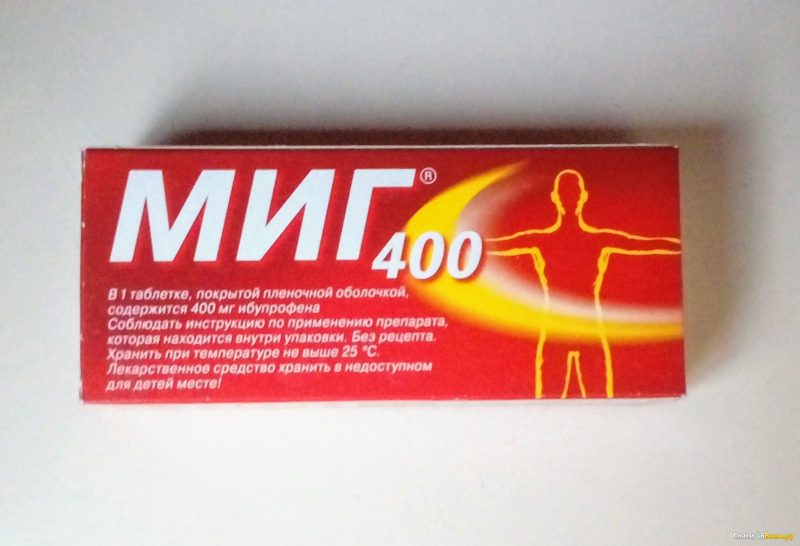
A pharmaceutical product is available both under the original name and in the form of numerous analogues, among which there are such means as:
- Advil tablets (ibuprofen 400 mg for adults and children from 12 years old);
- Ibufen, suspension (Nurofen for children) with 100 mg of the active substance in every 5 ml of the drug;
- MIG-400, film-coated tablets with a dosage of 400 mg;
- Nurofen in the form of tablets (200 mg);
- "Nurofen for children" (suspension 100 mg / 5 ml);
- "Pedea", ampoules with a solution for intravenous injections (10 mg / 2 ml);
- "Solpaflex" tablets and capsules of 200 mg;
- Faspik, dosage form - tablets, dosage - 400 mg.
All funds listed are accepted according to the schemes similar to the original drug.
Since 2000, several mass observations have been carried out, as a result of which a number of negative influences from nonsteroidal painkillers have been identified. Among the risks provoked by them, there is a tendency to sudden stomach bleeding and the development of a heart attack. From which the conclusion follows that this category of drugs cannot be unreasonably prescribed to yourself, bypassing the recommendations of the doctor.



